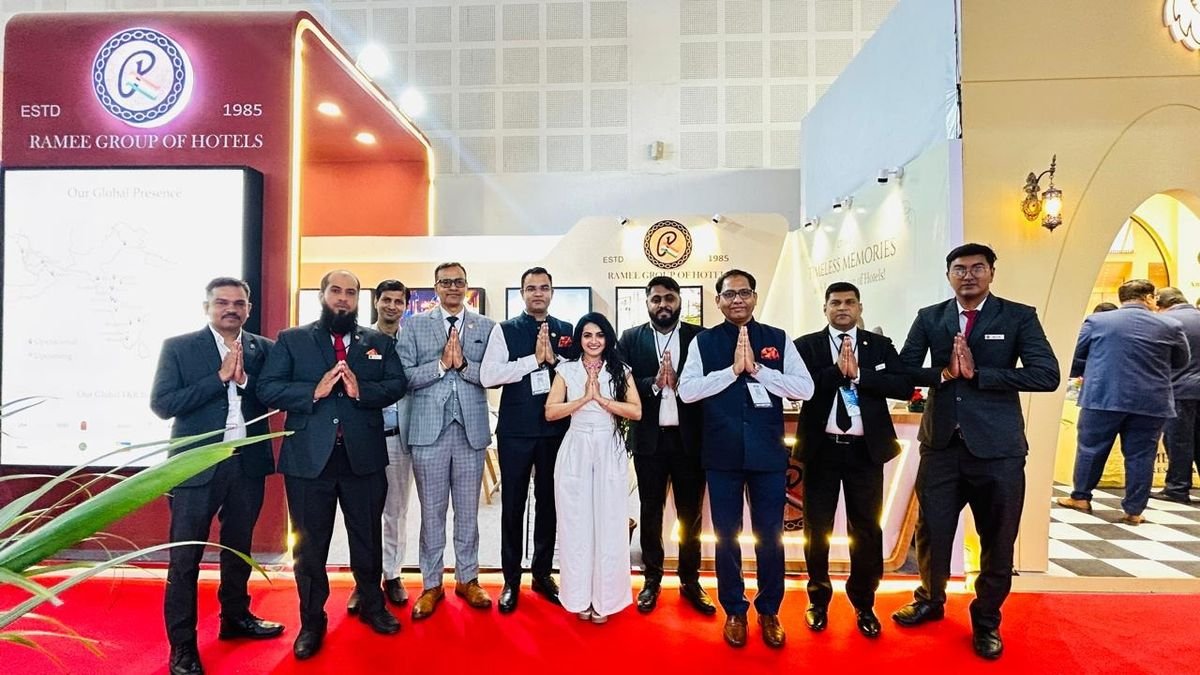Hotels & Accommodations
Ramee Group of Hotels Showcases Culture-Driven Hospitality at TTF 2025

Ahmedabad, August 8, 2025: Ramee Group of Hotels made a powerful impression at the Travel & Tourism Fair (TTF) 2025, held at Mahatma Mandir Convention Centre, Gandhinagar, Ahmedabad from 31st July to 2nd August. With an eye-catching presence at Booth A-807, the brand showcased its evolving hospitality portfolio and F&B-led experiences under the theme “Where Comfort Meets Culture,” a reflection of Ramee’s commitment to delivering location-inspired, experience-first stays.
Driven by the goal of strengthening its brand presence in key domestic and international markets, Ramee participated in TTF 2025 to network with B2B travel agents, tour operators, and industry stakeholders. The booth captured the essence of the brand’s diverse offerings from heritage and spiritual getaways to nightlife destinations and curated weddings.
Among the key announcements was the launch of Ramee Wolkenburg, Munnar, a serene retreat in Kerala’s highlands, and Bombay Adda, Andheri (Mumbai), the newest addition to Ramee’s celebrated nightlife portfolio. The group also introduced special Wedding and MICE packages for its hotels in Udaipur, Bhuj, and Bangalore, alongside exclusive B2B booking offers valid during the fair. Upcoming properties in Solapur and Rajkot were also announced, reinforcing the group’s expansion plans across India.
The response from visitors and industry peers was overwhelmingly positive. Guests appreciated the immersive booth experience and the diversity of offerings, while peers acknowledged Ramee’s innovation in blending cultural richness with modern hospitality. The team received strong business interest from DMCs, international travel agents, and wedding planners, validating Ramee’s growing reputation in the B2B space.
Led by Saurabh Gahoi, Senior Vice President, Ramee Group of Hotels, the booth was supported by key members from marketing, sales, and F&B teams. What continues to set Ramee apart is its full-stack hospitality model, not just premium accommodations, but also destination weddings, award-winning dining, and experiential nightlife. The brand’s ability to deliver modern comfort rooted in local culture positions it uniquely in a highly competitive market.
“TTF 2025 was a fantastic platform to showcase how Ramee Group of Hotels has evolved as a hospitality brand,” said Mr. Saurabh Gahoi. “From launching high-concept dining venues to expanding into culturally significant cities, our focus is on delivering value and experiences to today’s discerning traveler. We look forward to strengthening our B2B partnerships and continuing this momentum with more bold and meaningful hospitality ventures.”
The team walked away with valuable insights, including rising demand for experiential travel, growing interest in heritage and spiritual tourism, and the need for curated packages and direct booking offers. These learnings will shape Ramee’s upcoming brand and product strategies, as it continues to redefine hospitality for the modern Indian and international traveller.
Hotels & Accommodations
Airbnb embraces a paradox: CEO Brian Chesky says hotels are the future

Airbnb, the house-sharing pioneer long synonymous with offering travelers alternatives to traditional hotels, is now making hotels a cornerstone of its growth strategy. The company’s second-quarter 2025 earnings release and subsequent analyst call delivered both impressive financials and a candid roadmap for transformation, confirming that embracing hotels is no longer taboo for Silicon Valley’s home-sharing unicorn.
Airbnb blew past Wall Street expectations, reporting Q2 revenue of $3.1 billion—up 13% year-over-year—and adjusted earnings of $1.03 per share. Net income reached $642 million, and the company booked 134 million “nights and experiences,” a 7% annual increase. The accelerated demand extended globally, with Latin America and Asia Pacific leading growth, even as North America growth softened.
Investors seemed more attuned to Airbnb’s cautious guidance for the second half of 2025 as execs expect slower revenue and softer margins due to tough year-over-year comparisons and stepped-up investments in technology and regulatory compliance. Chesky called out increased competition from hotels and mounting regulatory pressure on short-term rentals as ongoing headwinds, forecasting Q3 revenue between $4.02 billion and $4.1 billion while confirming heavy investments in new initiatives might compress margins in the near term.
Investors responded by sending Airbnb’s stock down over 6% following the call, with the stock down more than 7% since earnings as of press time.
And about those hotels: Chesky said Airbnb will be competing more directly head-to-head with that segment of the travel sector.
“We’re going to be going significantly more aggressively into hotels,” Chesky said toward the end of the call. He added that Airbnb has spoken with hotels around the world, especially independent, boutique and bed-and-breakfast locations. “We’ve spent a lot of time looking at hotels as a business. We think it’s really compelling, and we think that there’s going to be a lot more to do with hotels on Airbnb.”
Airbnb’s hotel phase
Crucially, Airbnb’s call centered around its expansion “beyond the core”—including hotels. Chesky referred to it as an “and, not a or” strategy: Airbnb will maintain its iconic homes product while ramping up hotel supply, especially internationally where it’s still seeing opportunity for growth. “A huge percent of hotels in Europe are independents,” Chesky said.
Why the shift? Airbnb’s data suggests many travelers browse home listings but don’t always book, citing lack of availability or preference for hotel amenities. By integrating hotels, Airbnb fills network gaps—especially in cities and peak periods, when home options are limited.
The company’s HotelTonight application was offered by Chesky as an example of a successful acquisition. “We’ve historically primarily focused on building organically, but we absolutely are open to acquisitions, and we are going to be looking at it. And I think that we are now in a better place to consider acquisitions now that … we have this new expanded strategy where we’re focused not just on all aspects of traveling, but also living.”
It’s an open debate for some communities on Reddit whether a hotel or an Airbnb is the better choice. One thread, r/TravelHacks, features a discussion of whether there’s even a difference at this point. A commenter wrote the general consensus seemed to be that Airbnbs are better for large groups and hotels for solo trips, albeit dependent on the location. Surely, this is a gap that Chesky and Airbnb would like to see close.
Tech-powered hospitality and lifestyle expansion
Hotels are only part of Airbnb’s ambitious remake. Chesky also described efforts under way to turn Airbnb into what he described as an “AI-first application.” The company is betting on its AI-powered customer service agent to drive efficiency and personalization.
He said this agent, leveraging 13 specialized models trained on tens of thousands of customer interactions, has already managed to reduce the necessity for human intervention by 15%.
Chesky told analysts he believes “AI apps” will quickly become dominant—and Airbnb, as a “non-AI-native application,” needs to transform in that direction.
“We’re starting with customer service. We’re bringing into travel planning,” he said.
Then he described that what could look like.
“It will not only tell you how to cancel your reservation, it will know which reservation you want to cancel,” Chesky said. “It can cancel it for you and it can be agentic, as in it can start to search and help you plan and book your next trip.”
The CEO outlined future plans for deeper AI integration ranging from expanding language support to building toward a platform that can serve as an “everything app” for travel and experiences.
Chesky concluded the call by reinforcing Airbnb’s commitment to innovation and stressing what the company will not become: a commodity. “I don’t think we’re going to be the kind of thing where you just have an agent or operator book your Airbnb for you because we’re not a commodity. But I do think it could potentially be a very interesting lead generation for Airbnb.”
Earlier in the call, Chesky said Airbnb is probably the biggest travel brand in the U.S. and that the company’s current moves are about growing beyond that.
“What we’re trying to do is build a platform, a platform that has homes, services, experiences, hotels, of course, and much more. And we’re going to try to be expanding this platform and continue to [launch] new businesses over and over again.”
For this story, Fortune used generative AI to help with an initial draft. An editor verified the accuracy of the information before publishing.
Hotels & Accommodations
Will AI Make Hotel Websites Obsolete? |

By Gavi Shohet and Orit Naomi, HTN staff writers – 8.8.2025
As generative AI and autonomous digital agents increasingly shape how travelers plan and book trips, the role of the hotel website is entering a period of uncertainty. Once the cornerstone of direct bookings and brand storytelling, the traditional website is now facing serious competition. This competition is coming not from OTAs but from a new breed of AI-powered tools designed to bypass the front end of the internet altogether.
The rise of so-called agentic AI systems capable of planning, decision-making, and booking on behalf of users is challenging the value of hotel websites as both information sources and transaction platforms. AI agents can already search, compare, and book hotels without ever “visiting” a website in the human sense. Instead, they rely on APIs, connectivity protocols, and machine-readable data to access room availability, rates, and inventory.
In this model, hotel websites may no longer be the first or even second point of contact between a guest and a property. That contact increasingly happens between machines.
According to recent data from VertoDigital, only about 25 percent of AI-generated hotel answers are currently sourced from official hotel websites. The rest comes from public databases, OTAs, and proprietary information warehouses. As personal AI agents like ChatGPT Operator, Google Gemini, and Microsoft Copilot gain functionality, they will pull ARI (Availability, Rates, and Inventory) directly from connected systems via middleware or APIs. In some cases, AI agents are already skipping the website entirely and negotiating bookings agent-to-agent.
The implications for hotels are significant. In this fast-emerging landscape, the website becomes less a destination and more a data source. Unless hotels build and maintain well-structured, accessible, and accurate digital assets, AI systems may favor more robust third-party sources, further shifting visibility and bookings to OTAs.
That doesn’t mean websites are going away tomorrow. For many properties, especially independent and boutique hotels, the website remains essential for brand storytelling, rich visuals, and creating emotional appeal. These are elements that AI summaries and OTA listings typically lack. Hotel websites also still serve practical roles for compliance, localization and complex bookings.
However, as AI booking agents mature, traditional web interfaces are losing prominence. Travel planning is increasingly embedded in AI ecosystems that don’t involve visual browsing. Instead of a guest searching Google and clicking through to a hotel’s site, they’re prompting their AI to “book a pet-friendly hotel with a spa under $300 near the beach” and relying on the system to deliver a vetted option booked automatically in the background.
Hotel technology firms are beginning to respond. New booking platforms are being designed from the ground up with agentic AI in mind. DirectBooker, an AI connectivity startup backed by former Tripadvisor and Google Travel executives, is working to plug hotel ARI directly into tools like ChatGPT, enabling bookings without the user ever seeing the hotel’s own website.
Meanwhile, leading hotel chains and tech vendors are investing in API-first, AI-native architecture. This includes structured content optimized for generative engine optimization (GEO), dynamic data layers that interact with AI systems, and real-time bundling of offers through intelligent pricing engines.
Still, the level of preparedness varies widely across the industry. Many hotels, particularly smaller properties or those relying on legacy systems, lack the infrastructure to participate in this new ecosystem. And if a hotel’s ARI isn’t machine-accessible, AI agents may simply skip over it.
For now, websites serve both human guests and machine agents. But that dual role is becoming more demanding. Static brochure sites will not be enough. Instead, hotels need digital platforms that are fast, intelligent, integrated and API-connected, ones that are capable of serving both as a branding tool for humans and a structured data hub for machines.
The long-term risk is not that hotel websites disappear altogether, but that they fade into irrelevance as bookings shift to channels where hotels have less control and more competition. Without investment in the right infrastructure, hotels could find themselves invisible to the very systems guiding future travel decisions.
While AI won’t eliminate hotel websites any time soon, it is rapidly rewriting the rules of discovery and distribution. Hoteliers who want to maintain a direct connection to guests will need to adapt accordingly.
Related
Hotels & Accommodations
London’s Luxury Hotels Become More Affordable as Competition Grows

Published on
August 8, 2025 |
Luxury hotels in London are cutting their prices as the economy wobbles and new competition heats up. After the big revenge travel wave following COVID, when some rooms were one thousand pounds and up, the city’s top hotels are rethinking their nightly rates. The new prices are lower and more people can now book a luxury stay.
You can see the competition’s effect in the renowned hotels. Raffles at the OWO, which opened in 2023 and began at one thousand one hundred pounds a night, is now selling rooms for about eight hundred eighty pounds a drop of twenty percent. The Peninsula London, which started at one thousand three hundred pounds, now lists rooms from nine hundred pounds. Even the new Emory Hotel in Knightsbridge, which first charged one thousand six hundred pounds, is showing rooms from nine hundred thirty six pounds.
A Shift in London’s Hotel Market
The price reductions are not limited to new luxury entrants in the market. Established properties such as The Dorchester have also adjusted their pricing strategies. Where once rooms at The Dorchester began above one thousand pounds, the current rate starts at seven hundred fifty pounds. This shift is a result of increased competition among both new and established luxury hotels across London. According to industry data, average nightly rates at five-star hotels in the city have decreased by as much as twenty percent to fifty percent compared to the same period in 2024.
The influx of high-end hotel openings is not expected to slow down anytime soon. London is preparing for a wave of luxurious new properties, including the highly anticipated Chancery Rosewood in Mayfair, set to open in September, and the Six Senses London, slated to anchor the regeneration of the Bayswater neighbourhood. By 2026, other prestigious hotels, including Auberge Hotels and Mandarin Oriental, will further intensify the competition, adding more than one thousand new rooms to an already saturated market.
Supply and Demand Forces Behind the Price Drop
The changes in pricing are primarily driven by supply and demand dynamics. The increasing number of luxury hotels combined with global economic challenges have prompted hotel operators to adjust their rates. The high prices seen in 2024 were, in part, the result of hotels testing the market to gauge consumer willingness to pay top-tier prices. With economic uncertainty and a shift in consumer sentiment, many travellers are now looking for better value, even among ultra-high-net-worth individuals.
Unlike seasonal destinations where limited availability creates a natural scarcity effect, London remains a year-round travel hub. This consistent demand has lessened the impact of high rates, prompting hotels to revise their pricing to remain competitive.
Competition Fuels London’s Rise as a Luxury Hotel Destination
With hotels in London stepping up their game, the city’s luxury accommodation scene is now leading the pack, even outpacing Paris in quality and value. Sure, you can still find six-star staycations that don’t hold back, like the eagerly awaited Chancery Rosewood, which opens from one thousand two hundred eighty pounds per night. But many London venues are trimming their rates to grab a bigger piece of the luxury pie.
These smarter price moves reveal a bigger story in travel top-tier hotels everywhere are sharpening their rates and upgrading their services. For guests, that means what used to be a dreamed-of experience is now much closer to a reality.
-

 Brand Stories3 weeks ago
Brand Stories3 weeks agoBloom Hotels: A Modern Vision of Hospitality Redefining Travel
-

 Brand Stories2 weeks ago
Brand Stories2 weeks agoCheQin.ai sets a new standard for hotel booking with its AI capabilities: empowering travellers to bargain, choose the best, and book with clarity.
-

 Destinations & Things To Do3 weeks ago
Destinations & Things To Do3 weeks agoUntouched Destinations: Stunning Hidden Gems You Must Visit
-

 Destinations & Things To Do2 weeks ago
Destinations & Things To Do2 weeks agoThis Hidden Beach in India Glows at Night-But Only in One Secret Season
-

 AI in Travel3 weeks ago
AI in Travel3 weeks agoAI Travel Revolution: Must-Have Guide to the Best Experience
-

 Brand Stories1 month ago
Brand Stories1 month agoVoice AI Startup ElevenLabs Plans to Add Hubs Around the World
-

 Brand Stories4 weeks ago
Brand Stories4 weeks agoHow Elon Musk’s rogue Grok chatbot became a cautionary AI tale
-

 Brand Stories2 weeks ago
Brand Stories2 weeks agoContactless Hospitality: Why Remote Management Technology Is Key to Seamless Guest Experiences
-

 Asia Travel Pulse1 month ago
Asia Travel Pulse1 month agoLooking For Adventure In Asia? Here Are 7 Epic Destinations You Need To Experience At Least Once – Zee News
-

 AI in Travel1 month ago
AI in Travel1 month ago‘Will AI take my job?’ A trip to a Beijing fortune-telling bar to see what lies ahead | China

You must be logged in to post a comment Login